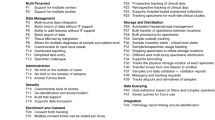Abstract
When there have been substantial failures by institutional leadership in their oversight responsibility to protect research integrity, the public should demand that these be recognized and addressed by the institution itself, or the funding bodies. This commentary discusses a case of research failures in developing genomic predictors for cancer risk assessment and treatment at a leading university. In its review of this case, the Office of Research Integrity, an agency within the US Department of Health and Human Services, focused their report entirely on one individual faculty member and made no comment on the institution’s responsibility and its failure to provide adequate oversight and investigation. These actions missed an important opportunity to emphasize the institution’s critical responsibilities in oversight of research integrity and the importance of institutional transparency and accountability.
Similar content being viewed by others
References
Baggerly, K., & Coombes, K. (2009). Deriving chemosensitivity from cell lines: forensic bioinformatics and reproducibility research in high-throughput biology. Annals of Applied Statistics, 3, 1309–1334.
Baggerly, K., & Gunsalus, C. K. (2015). Penalty too light. The Cancer Letter, 41(42). http://www.cancerletter.com/articles/20151113_2.
Barbash, F. (2015). Scientist falsified data for cancer research once described as ‘holy grail’. Washington Post, November 9, 2015
Colliton, B. J. (1983). Coping with fraud: The Darsee case. Science, 220, 31–35.
Duke University Student Newspaper. (2016). From last paragraph in http://www.dukechronicle.com/article/2015/06/unsettled-wake-potti-settlement
Geller, G., Boyce, A., Ford, D. E., & Sugarman, J. (2010). Beyond, “Compliance”: The role of institutional culture in promoting research integrity. Academic Medicine, 85, 1296–1302.
Goldberg, P. (2009) A biostatistics paper alleges patient harm in two Duke clinical studies. The Cancer Letter, 35(36), 1–2.
Goldberg, P. (2010). By defending Potti, Duke officials become targets of charges of institutional failure. The Cancer Letter, 26(28), 1–2.
Goldberg, P. (2011a). IOM Committee will probe Duke scandal together with other “omics” case studies. Cancer Letter, 37(1), 1–2.
Goldberg, P. (2011b). Deans acknowledge with holding key document from outside reviewers. The Cancer Letter, 37(2), 1, 6.
Goldberg, P. (2011c). FDA auditors spend two weeks at Duke: Nevins loses position in reorganization. The Cancer Letter, 37(4), 1–2.
Goldberg, P. (2011d). The Duke Scandal: Lancet Oncology yanks paper: NEJM says “no retraction”. The Cancer Letter, 37(5), 5, 6.
Goldberg, P. (2015a). Med students memo-research concerns. The Cancer Letter, 41(1), 1, 11.
Goldberg, P. (2015b). Duke officials silenced med student who reported trouble in Anil Potti’s lab. The Cancer Letter, 41(1), 1–2.
Goldberg, P. (2015c). Duke scientist: I hope NCI doesn’t get original data. The Cancer Letter, 41(2), 1–2.
Goldberg, P. (2015d). Duke’s legal stance: We did no harm. The Cancer Letter, 41(3), 1, 6.
Goldberg, P. (2015e). Duke settles with Potti’s patients: Misconduct probe now in fifth year. The Cancer Letter, 41(18), 1, 13.
Goldberg, P. (2015f). ORI’s deal with Potti doesn’t address the role Duke deans played in scandal. The Cancer Letter, 41(42), 1–2.
Hinkes-Jones, L. (2015). Patients, researchers demand further prosecution in Duke case, Bloomberg Daily Report for Executives. Special Report: Health Care, December 7, 2015. http://www.bna.com/patients-researchers-demand-n57982065145/
Institute of Medicine (IOM). (2012). Evolution of translation genomics: lessons learned and a path forward. National Academies Press. http://iom.nationalacademies.org/Reports/2012/Evolution-of-Translational-Omics.aspx
Knox, R. (1983). The Harvard fraud case: Where does the problem lie. JAMA, 249(1797–1799), 1802–1807.
Master, Z. (2015). A book review, A review of research misconduct policy in biomedicine: Beyond the bad-apple approach. Accountability in Research-Policies and Quality Assurance, 22, 192–197.
Office of Research Integrity in Office of the Secretary. (2015). Department of Health and Human Services, Findings of Research Misconduct, Federal Registry Code 4150-31, November 9, 2015. http://federalregister.gov/a/2015-28437
Redman, B. (2013). Research misconduct policy in biomedicine: Beyond the bad-apple approach. Cambridge: MIT Press.
Resnik, D. B. (2003). From Baltimore to Bell Labs: Reflections on two decades of debate about scientific misconduct. Account Research, 10, 123–135.
The Office of Research Integrity. (2016). http://ori.hhs.gov/about-ori. Accessed October 30, 2016
The Office of Research Integrity: Policies-Mission. (2016). http://ori.hhs.gov/ori-mission. Accessed October 30, 2016
The Office of Research Integrity: Whistleblowers. (2016). http://ori.hhs.gov/guidelines-whistleblowers. Accessed October 30, 2016
Yarborough, M., Fryer-Edwards, K., Geller, G., & Sharp, R. (2009). Transforming the culture of biomedical research from compliance to trustworthiness: Insights from non-medical sectors. Academic Medicine, 84, 472–477.
Author information
Authors and Affiliations
Corresponding author
Rights and permissions
About this article
Cite this article
DeMets, D.L., Fleming, T.R., Geller, G. et al. Institutional Responsibility and the Flawed Genomic Biomarkers at Duke University: A Missed Opportunity for Transparency and Accountability. Sci Eng Ethics 23, 1199–1205 (2017). https://doi.org/10.1007/s11948-016-9844-4
Received:
Accepted:
Published:
Issue Date:
DOI: https://doi.org/10.1007/s11948-016-9844-4




